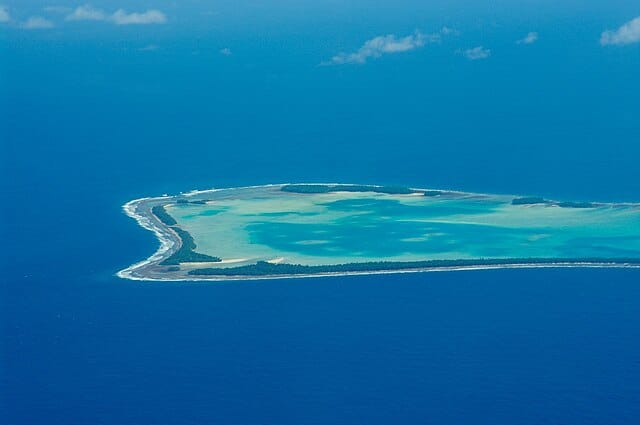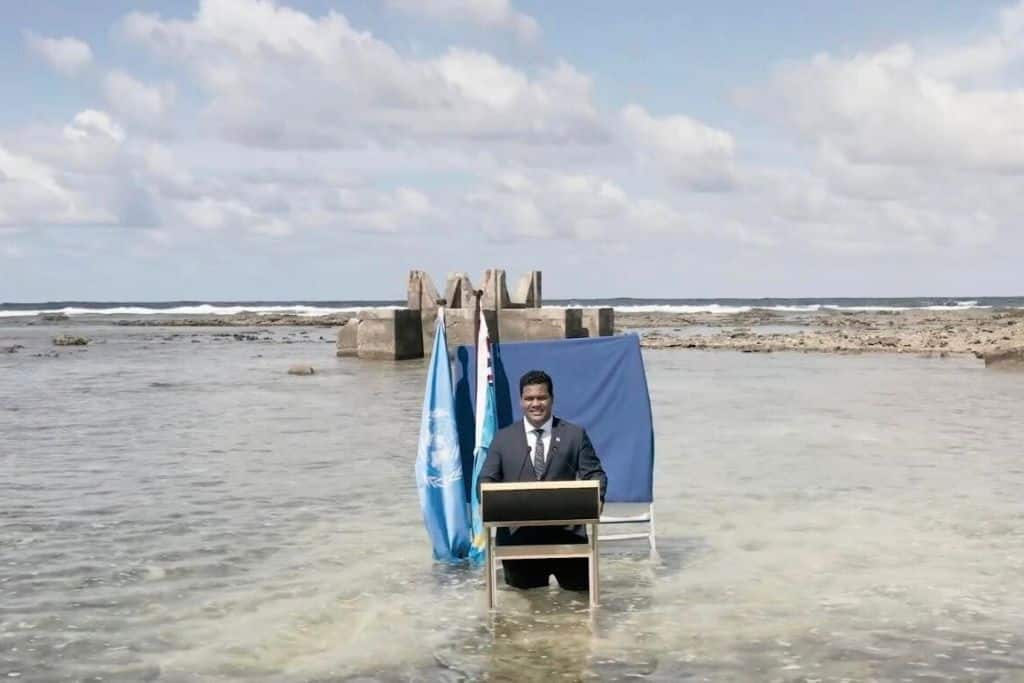In the vast expanse of the Pacific Ocean, Tuvalu’s sinking shores stand as a haunting testament to the immediate and irreversible impacts of climate change. As this tiny island nation grapples with the encroaching sea, its plight becomes a symbol of the urgent global crisis that demands our attention.
—
A Sinking Paradise
In 2021, the video of a man in a suit and tie urging world leaders to take action against climate change became viral and put small island nations and their struggles with sea level rise on the spotlight. The man in the video shown at the United Nations COP26 was not a conventional statesman – he was Tuvalu’s Foreign Minister Simon Kofe, and he delivered a powerful message with his very presence in the encroaching waters.
Nestled in the heart of the Pacific Ocean, Tuvalu, a collection of nine coral atolls and islands, emerges as a tranquil haven of natural beauty. This small island nation houses just over 11,000 people. Blessed with pristine landscapes and surrounded by azure waters, Tuvalu has long been celebrated for its unique charm. However, beneath this idyllic exterior lies a pressing and immediate challenge: the subtle yet relentless embrace of rising sea levels.
Tuvalu’s struggle is not just a local narrative but a poignant reminder for the wider repercussions of climate change to small island nations. As this paradisiacal archipelago grapples with the looming prospect of disappearing forever, it serves as a strong wakeup call that the impacts of climate change are not a distant future but an unfolding and harsh reality that needs immediate action.
Why Tuvalu is Sinking
Tuvalu’s vulnerability to climate change, particularly rising sea levels, is rooted in its geographical makeup. Comprising nine low-lying coral atolls and islands, Tuvalu faces the dual threats of global warming and the subsequent melting of polar ice caps and glaciers. The Intergovernmental Panel on Climate Change (IPCC) reports an accelerated rise in global sea levels affecting small island states, averaging 0.2 meters (0.7 feet) over the past century.
In addition to rising sea levels, Tuvalu is increasingly battered by more frequent and severe weather events, such as cyclones and storm surges. These events further erode the delicate balance of the island’s ecosystems, making life increasingly precarious for its residents.
You might also like: What Is Causing Sea Levels to Rise?
Implications for the Future
The sinking of Tuvalu holds profound implications for the global community and serves as a harbinger of what may unfold if urgent action to mitigate climate change is not taken. The loss of Tuvalu would not only displace its population but also eradicate a unique cultural heritage and history. The global community must recognize the interconnectedness of climate change, sea level rise, and the displacement of entire communities.
As one of the smallest and most vulnerable nations, Tuvalu also signals broader threats faced by other low-lying and island nations worldwide. The delicate ecosystems of these island nations are currently under threat, endangering unique flora and fauna as rising sea levels submerge habitats, disrupting their delicate balance. Moreover, water scarcity becomes a critical issue as rising temperatures and altered rainfall patterns affect islands dependent on limited freshwater resources, endangering both human populations and agriculture.
Additionally, coral bleaching, extreme weather events, and sea level rise will have an impact on food security, affecting agriculture and aquaculture, leading to financial instability. Lastly, the changing climate patterns brings heightened health risks creating environments conducive to the spread of vector-borne diseases, further jeopardizing the health of island populations.
According to a 2021 World Bank report, projected sea level rise could cost the Marshall Islands, a country in the North Pacific, halfway between Hawaii and Australia, its status as a nation. It has a population of 42,050 and a land mass of 180 square kilometers (70 square miles), consisting of 1,156 individual islands, and it is currently one of the countries most at risk of disappearing due to sea level rise.

You might also like: Coral Catastrophe: Expert Warns of Unprecedented Mass Bleaching in 2024
Tuvalu’s Foreign Minister’s Address from the Water
In 2021, in a poignant and symbolic act, Tuvalu’s Foreign Minister Simon Kofe recorded a speech for the United Nations climate conference, COP26, standing knee-deep in seawater to highlight how Tuvalu is on the frontline of climate change.
Standing in a suit and tie at a lectern setup in the sea, the Minister urged the global community to take immediate and decisive action to address climate change. The suit, typically associated with formal diplomacy and official addresses, juxtaposed against the watery backdrop served as a stark reminder that climate change is not a distant, abstract concern, but a reality affecting everyone.
“We stand here today, not as a plea for sympathy, but as a call to action. The rising waters that surround us are not just threatening our homes; they are a stark warning for the entire world. Tuvalu is on the front line of climate change, but we are not alone. The fate of Tuvalu is intertwined with the fate of every nation on this planet,” the Minister declared.
His historic address declared the urgency of the situation, emphasizing that the impact of climate change is not confined to a distant future but is unfolding now. The minister implored world leaders to set aside differences and work collaboratively to reduce carbon emissions, transition to sustainable energy sources, and support vulnerable nations in addressing the inevitable changes.
International Response
The sinking of Tuvalu has spurred renewed attention to the urgency of climate action. However, the international response has been mixed, with some countries taking bold steps to reduce emissions, while others lag behind. The Paris Agreement, signed in 2015, was a positive step forward, committing countries to limit global warming to well below 2C above pre-industrial levels. Nevertheless, achieving these goals remains a monumental change and, considering that 2023 was the warmest year on record, it is just a matter of time before Tuvalu and other small island nations succumb to the effects of climate change, unless immediate action is taken.
The Australia-Tuvalu Climate and Migration Agreement
On November 9, 2023, Australia and Tuvalu forged an unprecedented cooperation agreement known as the Falepili Union. This landmark deal extends a lifeline to 280 Tuvaluans annually, granting them permanent residency in Australia. The agreement encompasses three crucial aspects: climate cooperation, mobility, and security. Notably, Australia commits to assisting Tuvalu in adapting to climate impacts, contributing AU$11 million (US$7.2 million) to the Tuvalu Coastal Adaptation Project. The mobility component introduces a special pathway for Tuvaluans to live, study, and work in Australia permanently, while the security clauses include assistance following natural disasters.
As the agreement sheds light on the future of endangered states, there is a call for reflection and international frameworks to address relocation challenges, ensuring equitable outcomes.
The World Map Will Change
The sinking of Tuvalu is emblematic of the existential threat faced by small island nations worldwide. It urges us to reevaluate our priorities, implement sustainable practices, and take collective responsibility for the well-being of our planet. The fight against climate change is not just a battle for Tuvalu; it is a battle for the very survival of numerous vulnerable nations and the presentation of our shared global home. If we fail to heed this call, the sinking of Tuvalu may serve as a tragic prelude to the impending fate of other small island nations, completely altering the future world map, creating new borders, affecting migration patterns and geopolitics, thus making it imperative for the global community to act decisively and collaboratively in the face of this unprecedented global challenge.
Featured image: Ministry of Justice, Communication and Foreign Affairs, Tuvalu Government/screenshot
You might also like: Beyond Climate Science: Cultural Loss in the Pacific Islands


















